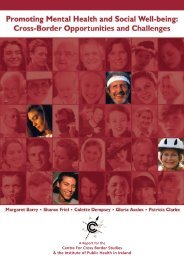improving government service delivery to minority ethnic ... - NCCRI
improving government service delivery to minority ethnic ... - NCCRI
improving government service delivery to minority ethnic ... - NCCRI
Create successful ePaper yourself
Turn your PDF publications into a flip-book with our unique Google optimized e-Paper software.
<strong>improving</strong><br />
<strong>government</strong><br />
<strong>service</strong><br />
<strong>delivery</strong><br />
<strong>to</strong> <strong>minority</strong><br />
<strong>ethnic</strong> groups<br />
Chapter 4: Ireland Research Findings 110_111<br />
206_The granting of leave<br />
<strong>to</strong> remain <strong>to</strong> the parents<br />
of Irish-born children is<br />
not unconditional and<br />
permanent and will be<br />
subject <strong>to</strong> an initial review<br />
after a period of two years.<br />
207_Also refer <strong>to</strong> the<br />
Context Chapter: Situation<br />
of Minority Ethnic Groups.<br />
208_Pavee Point Travellers<br />
Centre (2005), Irish<br />
Travellers Shadow Report<br />
<strong>to</strong> the Committee on<br />
the Elimination of Racial<br />
Discrimination, p.18.<br />
209_www.paveepoint.ie/<br />
pav_culture_a.html<br />
210_First Progress Report<br />
of the Committee <strong>to</strong><br />
Moni<strong>to</strong>r and Co-Ordinate<br />
the Implementation of the<br />
Recommendations of the<br />
Task Force on the Travelling<br />
Community (2000),<br />
available at:<br />
www.justice.ie/<br />
80256E010039C5AF/<br />
vWeb/pcJUSQ5ZCBRV-en<br />
Second Progress Report<br />
Of the Committee <strong>to</strong><br />
Moni<strong>to</strong>r and Co-Ordinate<br />
the Implementation of the<br />
Recommendations of the<br />
Task Force on the Travelling<br />
Community (2005),<br />
available at:<br />
www.justice.ie/<br />
80256E010039C5AF/<br />
vWeb/pcJUSQ6K2L2B-en<br />
211_Committee on the<br />
Elimination of Racial<br />
Discrimination (2005),<br />
Concluding observations<br />
of the Committee on<br />
the Elimination of Racial<br />
Discrimination, Ireland, UN<br />
Doc CERD/C/IRL/CO/2.<br />
14 April 2005.<br />
Asylum seekers and refugees<br />
Apart from the dramatic increase in labour migration from EU and non-EU countries between 1995 and 2004,<br />
there was also an increase in asylum seekers. From a low of 39 applicants in 1992 the number seeking asylum<br />
grew <strong>to</strong> 11,634 in 2002. Following the world-wide fall in asylum-seeking numbers, the 2004 Citizenship<br />
Referendum, the adoption of a fast-track system for the processing of asylum claims from so-called safe third<br />
countries and the introduction of carrier sanctions (which had the effect of making it much more difficult for<br />
would-be asylum seekers <strong>to</strong> reach Ireland) applicant numbers fell dramatically <strong>to</strong> 4,304 in 2005. The number of<br />
applications for the first three months of 2006 was 1,135.<br />
By the end of 2005, a <strong>to</strong>tal of 6,814 persons had been granted full refugee status since 2000; the largest<br />
communities were Nigerian and Romanian. This compares with a <strong>to</strong>tal of 48,632 applications processed since<br />
20 November 2000. In addition, there were 1,985 applications for family reunion between 2000 and March<br />
2006, for a <strong>to</strong>tal of 4,504 dependents, of which 3,822 have already been processed. 16,727 persons were<br />
granted leave <strong>to</strong> remain under a special application process for the parents of Irish-born children put in place<br />
after the Supreme Court 2003 Lobe and Osayande cases overturned the status quo ante whereby the majority<br />
of parents of Irish-born children acquired indefinite residence rights. 206 Currently, therefore, there are at least<br />
27,000 persons legally resident in Ireland who originally arrived as asylum seekers or who were granted entry as<br />
family members. They now constitute a significant range of diverse <strong>ethnic</strong> communities, further augmented by<br />
the several thousand children born since their arrival in Ireland. Many of the estimated 167 languages spoken<br />
nowadays in Ireland are in use among members of these communities.<br />
Travellers 207<br />
The census identified that the Traveller population in Ireland was around 24,000, representing 0.6% of the<br />
population of Ireland, although NGOs feel that the true figure is closer <strong>to</strong> 30,000. 208 Travellers are an indigenous<br />
<strong>minority</strong>, documented as being part of Irish society for centuries. Travellers have a long shared his<strong>to</strong>ry and value<br />
system which make them a distinct group; they also have their own language, cus<strong>to</strong>ms and traditions. 209<br />
Service provision <strong>to</strong> Travellers has been influenced by the 341 recommendations of the Task Force on the<br />
Travelling Community, published in 1995. The Task Force recommended that a formal moni<strong>to</strong>ring mechanism<br />
should be put in place <strong>to</strong> co-ordinate, oversee and progress the implementation process. A Committee was<br />
put in place; and has published two progress reports; 210 however without having seen full implementation of<br />
the recommendations, it appears that emphasis has shifted from this Committee <strong>to</strong> the High Level Officials<br />
Group on Traveller issues, which does not include any Traveller representation. The serious issues in relation<br />
<strong>to</strong> <strong>service</strong> provision <strong>to</strong> Travellers in Ireland were recognised in the UN Committee on the Elimination of Racial<br />
Discrimination’s (CERD) Concluding Observations in 2005. 211<br />
Students<br />
Students are not usually regarded as ‘immigrants’ in the classic sense. But recent years have seen a dramatic<br />
growth in the numbers of international students in the Irish education system. A survey by Education Ireland<br />
records a <strong>to</strong>tal of 22,947 non-Irish students registered in participating Higher Education Institutions in Ireland<br />
during the 2004-2005 academic year, 14,106 of whom are from non-EU countries. This figure does not include<br />
the much larger number of students enrolled in private language schools. In the case of the Chinese community<br />
alone, estimates of the number of Chinese students in Ireland vary from 13,000 <strong>to</strong> 60,000 or even more.
















